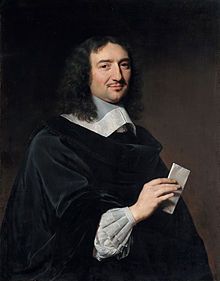
Back Jean-Baptiste Colbert Afrikaans جان باتيست كولبير Arabic جان بابتيست كولبير ARZ Jan Batist Kolber Azerbaijani Жан-Батыст Кальбер Byelorussian Жан-Батист Колбер Bulgarian Jean-Baptiste Colbert Breton Jean-Baptiste Colbert Catalan Jean-Baptiste Colbert Czech Jean-Baptiste Colbert Danish
Jean-Baptiste Colbert | |
|---|---|
 Portrait de Jean-Baptiste Colbert (1655) by Philippe de Champaigne | |
| First Minister of State | |
| In office 9 March 1661 – 6 September 1683 | |
| Monarch | Louis XIV |
| Preceded by | Jules Raymond Mazarin |
| Succeeded by | The Marquis of Louvois |
| Secretary of State of the Navy | |
| In office 7 March 1669 – 6 September 1683 | |
| Monarch | Louis XIV |
| Preceded by | The Marquis of Fresnes |
| Succeeded by | The Marquis of Seignelay |
| Secretary of State of the Maison du Roi | |
| In office 16 February 1669 – 6 September 1683 | |
| Monarch | Louis XIV |
| Preceded by | Antoine de Ratabon |
| Succeeded by | The Marquis of Louvois |
| Controller-General of Finances | |
| In office 12 December 1665 – 6 September 1683 | |
| Monarch | Louis XIV |
| Preceded by | Louis Le Tonnelier |
| Succeeded by | Claude Le Pelletier |
| Personal details | |
| Born | 29 August 1619 Reims, France |
| Died | 6 September 1683 (aged 64) Paris, France |
| Resting place | Saint-Eustache, Paris |
| Spouse |
Marie Charron (m. 1648–1683) |
| Children |
|
| Nickname(s) | Le Grand Colbert (The Great Colbert) |
| Academic career | |
| Field | |
| Institution | |
| School or tradition | Mercantilism |
| Influences | |
| Contributions | Colbertism |
| Awards | Order of the Holy Spirit |
| Signature | |
 | |
Jean-Baptiste Colbert (French: [ʒɑ̃.ba.tist kɔl.bɛʁ]; 29 August 1619 – 6 September 1683) was a French statesman who served as First Minister of State from 1661 until his death in 1683 under the rule of King Louis XIV. His lasting impact on the organization of the country's politics and markets, known as Colbertism, a doctrine often characterized as a variant of mercantilism, earned him the nickname le Grand Colbert ([lə ɡʁɑ̃ kɔl.bɛʁ]; "the Great Colbert").
A native of Reims, he was appointed Intendant of Finances on 4 May 1661. Colbert took over as Controller-General of Finances, a newly created position, in the aftermath of the arrest of Nicolas Fouquet for embezzlement, an event that led to the abolishment of the office of Superintendent of Finances. He worked to develop the domestic economy by raising tariffs and encouraging major public works projects, as well as to ensure that the French East India Company had access to foreign markets, so that they could always obtain coffee, cotton, dyewoods, fur, pepper, and sugar. He acted to create a favorable balance of trade and increase colonial holdings. As there was slavery in the colonies, in 1682, Colbert commissioned the beginning of a project that would become the Code Noir in 1685, two years after his death.[1] In addition, he founded France's merchant navy (marine marchande), becoming Secretary of State of the Navy in 1669.
His effective market reforms included the foundation of the Manufacture royale de glaces de miroirs in 1665 to supplant the importation of Venetian glass, which was forbidden in 1672 as soon as the national glass manufacturing industry was on sound footing. Also encouraging the technical expertise of Flemish cloth manufacturing in France, he founded royal tapestry works at Gobelins and supported those at Beauvais. He issued more than 150 edicts to regulate the guilds.[2] The Académie des sciences was founded in 1666 at his suggestion; he was a member of the Académie française from 1 March 1667 to his death, where he occupied the 24th seat, to which Jean de La Fontaine was later elected. His son Jean-Baptiste Colbert, Marquis de Seignelay (1651–1690), succeeded him as Navy Secretary.
- ^ Richardt, Aimé (1997). Colbert et le colbertisme (in French). Tallandier. p. 261. ISBN 9782235021562.
Promulgué deux ans après la mort de Colbert (en 1685), le code noir avait été conçu par lui sous le nom de code des colonies.
- ^ One such law had the intention of improving the quality of cloth. The edict declared that if the authorities found a merchant's cloth unsatisfactory on three separate occasions, they were to tie him to a post with the cloth attached to him.